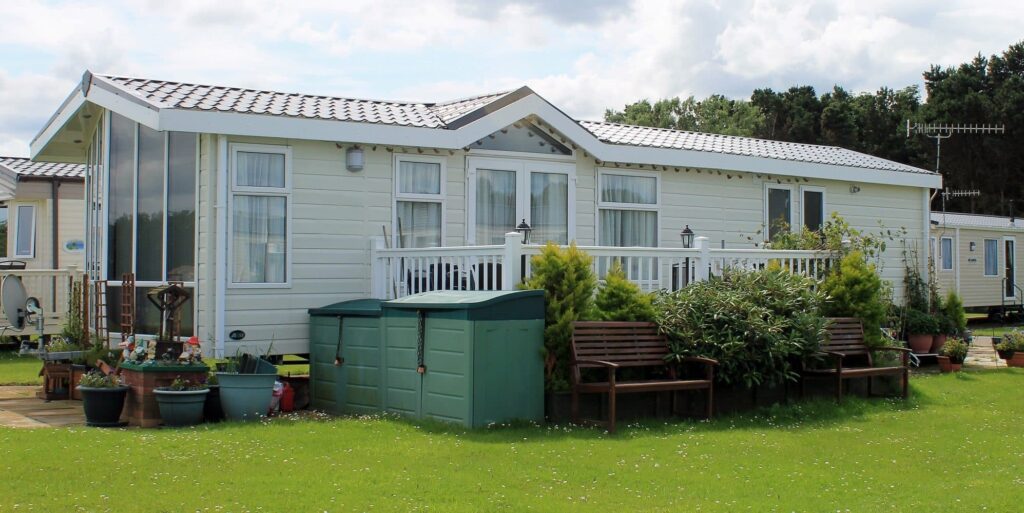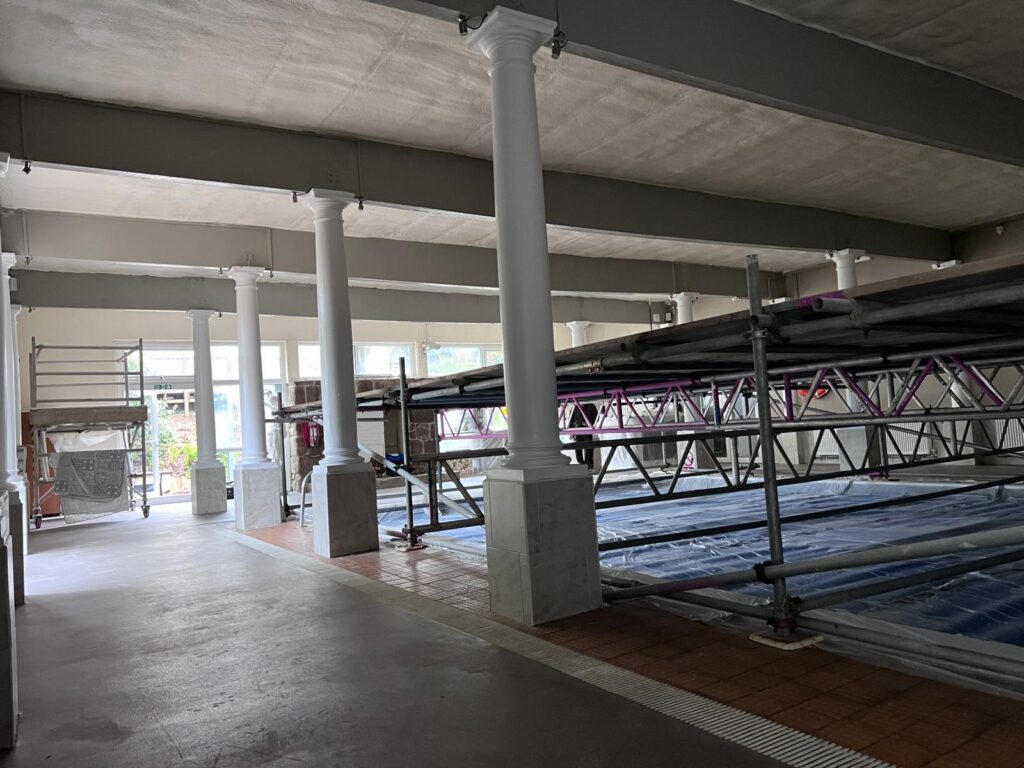Park Home Insulation
Park homes represent an integral part of the UK’s housing landscape, offering a unique blend of quaint charm, affordability, and flexibility. These homes, while appealing, often present challenges in thermal regulation due to their specific construction methods. Consequently, residents sometimes experience temperature variations, leading to discomfort during extreme weather conditions.
Park home insulation emerges as the key to bridging this comfort gap. Comprehensive insulation not only amplifies the comfort quotient but also injects efficiency, ensuring that the charm of living in a park home is complemented with the warmth and cosiness akin to traditional homes.
As we delve deeper into the world of park home insulation in this guide, we’ll uncover the nuances of its importance, the standards set in the UK, the options available, and why choosing the right insulation is pivotal for a snug, energy-efficient living experience.

What's on this page?
Park home insulation standards UK
In the United Kingdom, standards for park home insulation are governed by the British Standard BS 3632. This standard delineates the residential specification for park homes, indicating the construction, insulation, and other requirements to make them habitable year-round.
The BS 3632 standard demands that park homes maintain a reasonable degree of thermal insulation to keep the property warm in winter and cool in summer. This includes insulation in the walls, floor, and roof of the property. Furthermore, BS 3632 emphasizes that the materials used for insulation should be durable and non-combustible to ensure safety and longevity.
Specifically, the standards stipulate that the U-values (a measure of heat loss) for park homes should not exceed 0.35 W/m²K for walls and roofs, and 0.25 W/m²K for floors. A lower U-value signifies better insulation and less heat loss.
Compliance with these standards ensures that park homes are energy-efficient, resulting in reduced energy costs and a smaller carbon footprint. Moreover, meeting these standards is not only about compliance but also about providing park home residents with a comfortable living environment throughout the year.
It’s worth noting that as environmental concerns grow and technology advances, these standards might become stricter, advocating even better insulation methods. This is where spray foam insulation for park homes has gained prominence due to its superior insulation properties, enhancing comfort and energy savings for park home dwellers.
Benefits of insulating a park home
Park homes, with their unique construction and typically compact design, can be incredibly energy-efficient when properly insulated. Insulation serves not just as a barrier to the external environment but as a way to enhance the overall living experience in a park home. Here are the numerous benefits of insulating a park home:
Enhanced Thermal Comfort
One of the primary benefits of insulation is the improvement in a home’s internal thermal environment. Proper insulation ensures that the park home remains warm during the cold winter months and cool during the scorching summer heat, thus offering year-round comfort.
Energy Savings
Proper insulation can prevent heat loss, meaning the heating system doesn’t have to work as hard. As a result, park home residents can see a significant reduction in their energy bills. According to various studies, well-insulated homes can deliver up to 50% greater energy savings compared to homes without effective insulation.
Environmentally Friendly
A well-insulated park home requires less energy for heating and cooling, leading to a reduction in carbon emissions. This not only means cost savings for the homeowner but also a smaller carbon footprint, making it an eco-friendly option.
Reduction in Condensation
Insulation helps in reducing the chances of condensation forming inside the home. Condensation can lead to mould growth, which poses health risks and can damage the home’s interior. Proper insulation combats this by regulating the internal temperature and reducing the likelihood of condensation.
Noise Reduction
Insulating materials act as a barrier to external noise. For park homes located near busy areas or where external noise is a concern, insulation can significantly reduce the intrusion of unwanted sounds, creating a more serene living environment.
Increased Property Value
Homes that are well-insulated often have a higher resale value compared to those without proper insulation. As energy efficiency becomes a higher priority for many buyers, having a well-insulated park home can be a significant selling point.
Longevity of the Home
Effective insulation can protect the structural integrity of the park home. It prevents issues like dampness from condensation, which can lead to rot or corrosion over time. By insulating your park home, you’re not just ensuring a comfortable living space but also prolonging the lifespan of your investment.
Consistency in Indoor Temperatures
One of the notable benefits of insulation is the consistent temperature it offers throughout the home. There are no cold spots or draughty areas, ensuring every corner of the home is comfortable.
Cost-effective in the Long Run
While the initial cost of insulating might seem high, the long-term savings in energy bills make it a cost-effective solution. Plus, considering the added comfort, increased home value, and health benefits, it’s an investment that offers excellent returns.
Safety and Health
A well-insulated home reduces the risk of issues like mould and dampness, which can cause respiratory problems and other health concerns. By maintaining a dry and warm environment, the insulation ensures a healthier living space.
Insulating a park home is an investment that pays off manifold. Not only does it offer monetary savings and enhanced comfort, but it also contributes to a healthier environment, both inside the home and for the planet. And with the evolving trends in energy efficiency and sustainable living, having a well-insulated park home aligns perfectly with the future of responsible housing.
Park Home Insulation Options
When it comes to park home insulation, various options are available, each with their own unique benefits. Your choice will likely depend on several factors, including the home’s design, your budget, and the desired level of energy efficiency. Here are the most commonly used insulation options for park homes:
Fibreglass Insulation
Fibreglass is a widely-used insulation material due to its affordability and availability. It comes in batts or rolls and can be installed in various areas, including the walls, roof, and underfloor of the park home. However, it requires careful installation to avoid gaps and ensure maximum effectiveness.
Mineral Wool Insulation
Like fibreglass, mineral wool is available in batts or rolls and can be used in walls, roofs, and floors. It is fire-resistant and offers good soundproofing. However, it can be more expensive than fibreglass and may not provide the same level of energy efficiency as other options.
Cellulose Insulation
Made from recycled paper products, cellulose insulation is an eco-friendly option. It is typically blown into cavities, making it a good choice for hard-to-reach areas. However, it can settle over time, reducing its effectiveness, and it may require a vapour barrier in damp climates.
Polystyrene Board Insulation
Polystyrene boards, either expanded or extruded, offer a high insulating value and can be used in walls, floors, and roofs. They are resistant to moisture, making them a good option for areas prone to dampness. However, they must be correctly installed to avoid gaps that can lead to thermal bridging.
Spray Foam Insulation
Spray foam insulation is a highly effective and increasingly popular insulation option. It expands upon application, filling all cavities and voids to create an airtight seal. There are two main types: open-cell and closed-cell. Open-cell is softer and less expensive but offers a lower R-value (insulating value). Closed-cell offers a higher R-value, is more rigid, and provides excellent moisture resistance. Spray foam insulation can deliver up to 50% greater energy savings compared to other insulation products, making it the superior choice.
Each of these insulation options has its place, but the benefits of spray foam insulation make it a standout choice for park homes. Its ability to provide a high level of thermal resistance, coupled with its superior airtightness, makes it a cost-effective, long-term solution for reducing energy costs and improving comfort. It’s important to remember, however, that a professional should always install spray foam insulation to ensure it’s done correctly and safely.
Before deciding on the right insulation for your park home, it’s advisable to consult with a professional insulation installer, like Spray Foam Tech, to understand what would work best for your specific situation.
How much does it cost to insulate a park home?
Insulating a park home is an investment, not just in terms of money but also in the future comfort, efficiency, and value of the property. The cost of insulation varies based on several factors. Here’s a breakdown of what you might expect:
- Type of Insulation: Different insulation materials come with varying price tags. For instance, fibreglass and mineral wool tend to be more affordable than spray foam insulation. However, when you factor in the long-term benefits, such as energy savings, spray foam often delivers better value for money.
- Size of the Park Home: A larger park home will naturally require more material to insulate, leading to higher costs. This applies to both the exterior size and the internal spaces that need insulation.
- Complexity of the Job: If there are hard-to-reach areas, complex structural elements, or other factors that make the insulation job more challenging, the cost might be higher. A straightforward job on a newer park home could be less expensive than a complex task on an older model.
- Condition of the Park Home: If the home is older or has issues like dampness, mould, or structural problems, these might need to be addressed before or during the insulation process, adding to the cost.
- Professional Installation: Opting for a professional installation might increase the initial costs, but it ensures the job is done correctly, safely, and with maximum effectiveness. An improperly installed insulation can lead to issues down the line and diminish the expected energy savings.
The insulation costs for park homes vary depending on these factors and more. While it’s challenging to provide an exact figure without a detailed assessment, it’s essential to look at the insulation as a long-term investment. A well-insulated park home can offer substantial energy savings over the years, often making up for the initial expense.
For an accurate cost estimate tailored to your park home, it’s crucial to arrange a pre-installation survey with a qualified installer. This allows professionals to assess the specific needs of your property and provide a detailed quote. If considering spray foam insulation, arranging an assessment with a specialist, such as Spray Foam Tech, can ensure you receive an accurate and competitive estimate for your insulation needs.
Conclusion
The comfort, energy efficiency, and durability of your park home can be greatly improved with the right insulation. Spray foam insulation has emerged as a popular and efficient choice, offering comprehensive benefits such as increased energy savings, heightened comfort, and enhanced structural integrity. While the initial cost may be a concern for some, the long-term savings on energy bills highlight its effectiveness and return on investment.
However, each park home is unique, and insulation should be tailored to specific needs. It’s essential to consider factors like your home’s age, structure, and location, as well as your budget and lifestyle requirements. Seeking professional guidance, like the services offered by Spray Foam Tech, can ensure you make the best insulation choices for your park home.
In the end, the goal of park home insulation is to create a comfortable, energy-efficient living environment that stands the test of time. With the right information and professional assistance, you can make informed decisions that will benefit your park home for years to come. For more information or to arrange a pre-installation survey with a qualified installer from Spray Foam Tech, don’t hesitate to reach out to us.




